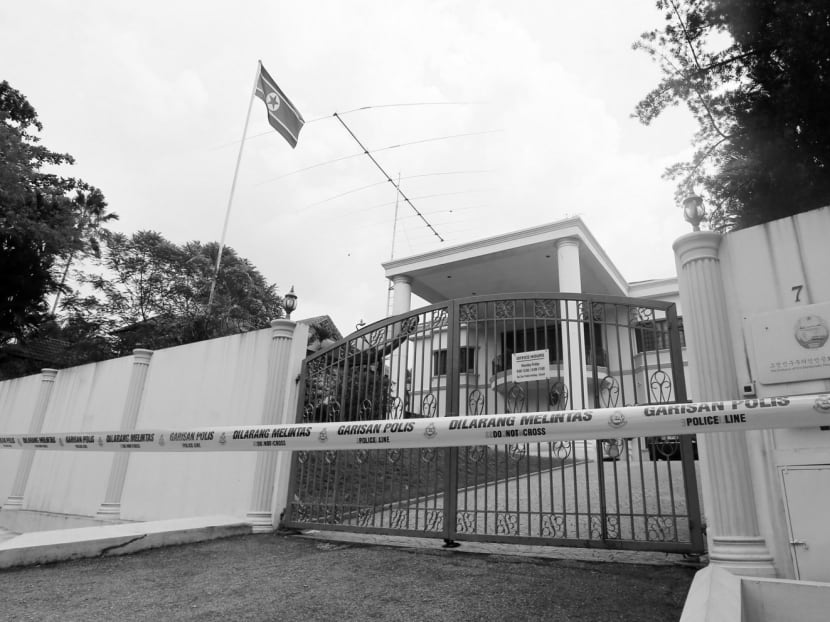Surprising roots of Malaysia’s rage against N Korea
It did not take long for Malaysia to retaliate against North Korea for barring its citizens from leaving the country on Tuesday. Within hours, a security cordon was thrown around North Korea’s Malaysian embassy to prevent diplomatic staff from leaving.

The North Korean embassy, which was sealed off, in Kuala Lumpur, Malaysia. Security surrounded the embassy within hours of Pyongyang barring Malaysians from leaving the DPRK on Tuesday. Photo: Reuters
It did not take long for Malaysia to retaliate against North Korea for barring its citizens from leaving the country on Tuesday. Within hours, a security cordon was thrown around North Korea’s Malaysian embassy to prevent diplomatic staff from leaving.
The response may not be legal under international law, but it is certainly understandable. North Korea is not only accused of sponsoring an assassination in Malaysia’s busiest airport, but also using a banned nerve agent. It has since taunted and bullied Malaysian officials attempting to investigate the crime.
But Malaysia’s aggressive response is not just about the assassination. Arguably, its roots can be traced back to the flurry of criticism roused by the government’s response to the loss of Malaysia Airlines Flight MH370, three years ago.
Embarrassed at home and abroad, the Malaysian government found itself in a political crisis largely of its own making. In recovering, it appears to have learnt some important lessons, which it is now applying to North Korea.
It is important to remember that the current standoff is out-of-keeping with Malaysia’s diplomatically accommodating past. Non-alignment and non-interference have long been treasured principles; and the country has maintained a careful balance between the United States and China.
The approach has yielded material gains, as well as stability. Having reinstated diplomatic ties with China in 1974, for instance, long before most countries, Malaysia has greatly benefited from Chinese investment and other economic opportunities.
Before the current crisis, Malaysia was among the more open countries in the world to North Korean travellers and businessmen (to a fault, allegedly). But Pyongyang’s response to Malaysia’s investigation into the murder of Kim Jong-nam, the half-brother of North Korean leader Kim Jong-un, hit a sensitive nerve.
In the wake of the March 2014 disappearance of MH370, the Malaysian government, unaccustomed to being questioned aggressively by the international media, much less local journalists, was accused of being evasive and even condescending during press briefings.
For many Malaysians, global ridicule was not even the worst of it. Angry relatives of Chinese passengers on the doomed flight were allowed to protest at the Malaysian embassy in Beijing (protests in the Chinese capital are almost never allowed), and later held Malaysia Airlines staff hostage for 10 hours. The government’s response seemed timid to many. One former Malaysian envoy said: “China has bullied the Philippines and Vietnam; so Malaysia has to be careful.”
As the full scope of missed opportunities, errors and diplomatic indignities in the tracking and subsequent search for MH370 accumulated in press accounts, public opinion turned against a government that was already struggling for support after an unexpectedly close election.
Anwar Ibrahim, then-leader of Malaysia’s opposition, summed up the frustration shortly after shamans turned up at Kuala Lumpur International Airport to help in the search: “All the contradicting statements, our slow response. Our credibility and image have been shattered, destroyed.”
While Anwar’s comments may have been uttered in self-interest, the fact is that Malaysia has continued to suffer in international esteem in the years since the disappearance of MH370. Most notably, the government’s response to allegations of financial malfeasance at the government-owned 1MDB investment fund have inspired widespread criticism abroad, as well as multiple investigations.
All of this seems to have encouraged the government to be much more transparent and forthcoming about its investigation into the Kim assassination, holding multiple press conferences and answering questions robustly.
If it needed any more spine-stiffening, it had only to peruse Malaysian social media, which quickly took offense to North Korea’s provocative, deceitful, and even intimidating statements, so reminiscent of China’s bullying after the MH370 incident.
On Feb 23, the youth wing of Malaysia’s long-time ruling coalition held a protest outside the North Korean embassy to demand that Malaysia withdraw visa-free access for North Korean citizens. To the surprise of many, it was revoked a week later.
Of course, it is much easier for Malaysia to push back against bullying from North Korea than from China. But the mere fact that North Korea’s aggressive rhetoric was addressed quickly and with tangible actions has quietened many of the critical voices that had spoken up during past crises.
For the Malaysian government, which is expected to call elections later this year, that in itself is a victory. Hopefully, it has also created room for both sides now to climb down from their current standoff. BLOOMBERG
ABOUT THE AUTHOR:
Adam Minter is an American writer based in Asia, where he covers politics, culture and business. He is the author of Junkyard Planet: Travels in the Billion-Dollar Trash Trade.






